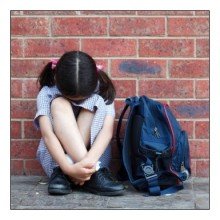Please let’s stop calling children ‘bullies’ when we are talking about behaviour (and in that group I mean young people up to the age of sixteen). To call a child a bully is inaccurate, unhelpful and could be damaging. It is the behaviour we need to describe – not the child.
First – let’s get the cards on the table. I believe children are pretty much born as blank canvases – yes they have self-determination and uniqueness – but essentially how they behave are reflections of how they are brought up, the experiences they have and the result of how people treat them.
Bullying behaviour is just one kind of behaviour that children learn – as is loving behaviour, kind behaviour, thoughtful, careless, thieving, confident behaviour and so on.
So how do we get children to behave in civilised ways – to think about others, to read body language, to know when something is unkind, to be polite, to help people, to treat people well, to share, look after and be considerate – well we as adults have to teach them and they as learners have to learn it, practise it, get it wrong, reflect on it and try again. And on the whole it is not learned through shouting, punishment, labelling or chastising.
But I am not too sure it is taught very well these days. Do parents teach children how to share, be kind, be loving, to be polite and helpful in an explicit way? Do schools actually have lessons in sharing, kindness, cooperation or is it presented in a way that it is more caught than taught.
Good behaviour is learned through gentle reminders, practise, reward, commending, teaching and above all role modelling. To learn how to greet someone appropriately we show them that we as adults shake hands, look the person in the eye and say good morning. More intimate friends we smile, kiss them on the cheek and ask them how they are. Children pick up this way of behaving and emulate it from quite a young age. Sometimes a gentle reminder is needed, “Shake hands Jono and say ‘Good Morning’ to Mrs Harris”.
As they grow older so more lessons are learned. How to share, how to compliment, how to ask for something, how to play cooperatively.
However, if these skills are not taught explicitly, either in school or in the home it is unlikely that the child will learn them. On the other hand if they see their parents and teachers shouting, criticising, putting down, grabbing, punishing and embarrassing them these will be the skills (and feelings) that they pick up instead.
And in schools we are not very consistent about teaching children good manners; how to share, to play cooperatively – we let the children out in the playground and tell them to get on with it. In classrooms usually the teacher is in control, taking responsibility for how children behave. “No sit down Claire, wait your turn”. “Bill, can you get the pencils and give them out?”. “Anjali – please collect up the books and put them away.”
So if children use bullying behaviour it is something that we have to teach them not to use. One way of doing that is to compliment them on the behaviour you do like whilst making it clear the behaviour you don’t. “Tilda, please don’t kick Jenni, that is unkind behaviour. You were playing so nicely earlier when you were teaching her how to play draughts. That is the behaviour we want in this classroom please”.







